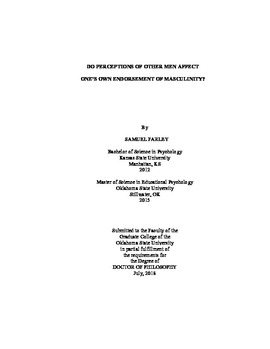| dc.description.abstract | Numerous articles have established the negative outcomes associated with holding a traditionally masculine ideology (Berger et al., 2005; Descutner & Thelen, 1991; Gale, 1996; Jakupcak, Lisak, & Roemer, 2002; Levant & Wimer, 2014; Santana, Raj, & Decker, 2006). Connell (2005) has speculated that a vocal minority can set the standards of masculinity that a silent or complicit majority follow or must relate too. Few studies have investigated how this process may occur within the area of masculinity. Pluralistic ignorance (the belief that one's attitudes and behavior differ from others, when this difference does not exist; Boon and Yoshimura, 2014) has been shown when present to affect one's own behaviors or attitudes (Fabiano, Perkins, Berkowitz, Linkenbach, & Stark, 2003). Casey et al., (2016) have found that men overestimated other men's adherence to traditional masculine norms. This study investigated this concept to see how perceptions of others beliefs might influence one's own behavior. This study had two objectives. The first objective was to determine if participants are endorsing pluralistic ignorance when considering their own and others masculine ideology. The second objective was to determine if this, pluralistic ignorance, then predicted conformity to more traditionally masculine norms. The results supported that men do endorse pluralistic ignorance, perceiving other men to hold more traditional masculine norms. The second hypothesis was not supported, but several correlations were found between pluralistic ignorance and conformity to masculine norms subscales. These results are discussed further as well as the implications this has for counseling psychology. | |
